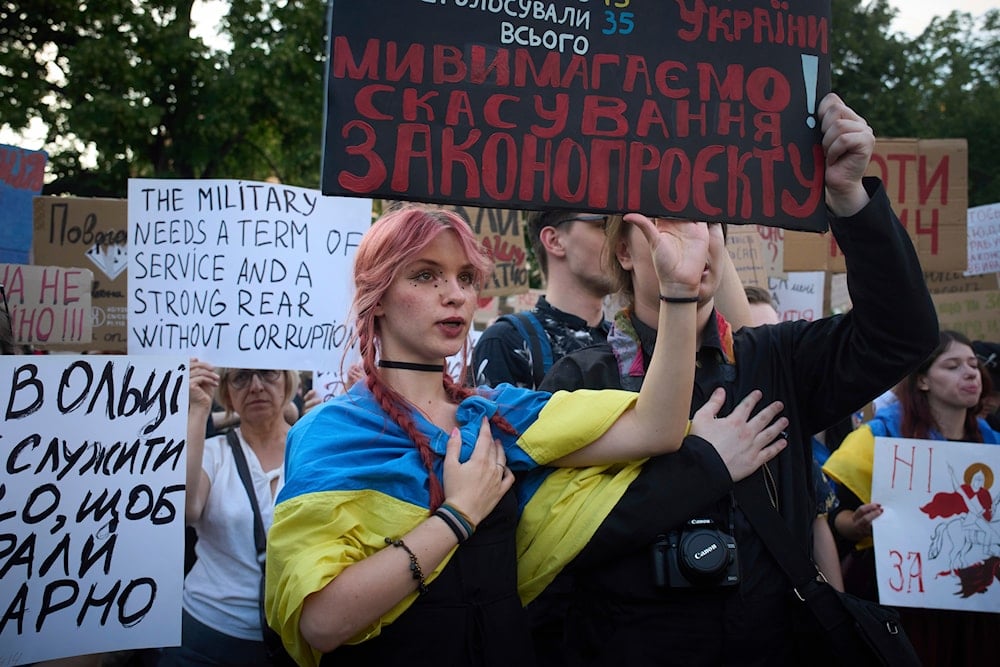Ukraine’s anti-corruption crisis triggers protests, EU backlash: FT
Zelensky’s move to centralize control over Ukraine’s anti-corruption agencies sparked mass protests and EU backlash, putting billions in funding at risk.
-

Demonstrators protest against a new bill proposed by Ukrainian President Volodymyr Zelensky concerning the country’s anti-corruption agencies, in Kiev on Ukraine, on July 24, 2025. (AP Photo/Efrem Lukatsky)
Ukrainian President Volodymyr Zelensky faced intense domestic and international backlash last month after signing a controversial law granting the prosecutor-general expanded control over two key anti-corruption institutions: the National Anti-Corruption Bureau and the Specialised Anti-Corruption Prosecutor’s Office.
In a report published on the Financial Times (FT), Ivan Krastev stated that these institutions, created in Ukraine in 2013-2014 with strong Western support, have long been seen as cornerstones of Ukraine’s democratic accountability. Zelensky’s move sparked widespread concern that the law would compromise their independence and undermine Ukraine’s anti-corruption efforts.
The decision triggered the most serious diplomatic crisis yet between Kiev and its Western allies, with up to €60 billion in EU-linked financial support placed at risk, according to the report. It added that both the EU and the International Monetary Fund (IMF) expressed alarm at the legislation, signaling that the move could jeopardize future aid disbursements unless reversed.
According to the FT, under mounting pressure from both international institutions and Ukrainian society, Zelensky abruptly reversed course, restoring the agencies’ autonomy. The episode underscored the enduring influence of public protest and international accountability in shaping policy.
The law's passage ignited the largest anti-government protests in Ukraine since the start of the war in 2022. Thousands poured into the streets of Kiev and other cities under banners reading "Corruption kills" and "Ukraine is not Russia."
The report highlights that until now, open criticism of the government during wartime had been considered taboo. The demonstrations marked a breaking point, a moment when civic outrage over corruption and institutional capture outweighed the pressure to maintain national unity at all costs.
'Ukraine is not Russia': Citizens defend democratic oversight
Corruption is widely blamed for the delayed construction of defensive fortifications and recent military setbacks. There is growing concern that the war itself, with its high stakes and massive financial flows, is creating new opportunities for abuse at the highest levels of government, the report argues.
Moreover, the report mentions that Zelensky’s attempt to consolidate power over anti-corruption bodies, which will likely shield loyalists facing scrutiny, was seen as a serious miscalculation. It adds that many believe he overestimated Western reluctance to criticize Ukraine during wartime and underestimated the strength of domestic resistance to authoritarian drift.
The Ukrainian crisis comes amid similar scenes in Bulgaria, where thousands recently protested the abuse of the country’s anti-corruption commission. In Sofia, demonstrators accused the nominally independent body of becoming a political tool used to discredit opposition figures, including the controversial arrest of the mayor of Varna.
Based on the report's analysis, ironically, those calling for the agency’s closure are the same political actors who originally empowered it. It adds that the episode raises broader concerns about selective justice, where anti-corruption mechanisms are used not to uphold the rule of law, but to shield allies and target opponents.
Protesters warn against selective justice
Both Ukraine and Bulgaria illustrate how easily anti-corruption agencies can be politicized if not properly safeguarded. While citizens in both countries reject corruption, they also recognize the dangers of institutions being captured and used as weapons in political conflict.
The central question is no longer whether anti-corruption bodies are needed, but how to ensure they remain genuinely independent. As the Bulgarian example shows, institutional design alone is not enough. Vigilant public oversight and the willingness to take to the streets remain essential.
Zelensky’s reversal may have averted a financial and political crisis for now, but the incident leaves behind a trail of concerns. It exposed the fragility of reforms under wartime conditions and the persistent temptation among leaders to use institutional control as a means of political self-preservation.
Ultimately, the Ukrainian president misjudged both Europe and his society. His attempt to subvert anti-corruption independence was an unforced error and a gift to Russia’s narrative about Ukraine’s governance, the report suggests.
As one protester warned, allowing any government to define who is corrupt is a dangerous step. In the words of Karl Lueger, the infamous mayor of Vienna, “I decide who is a Jew.” In today’s context, if corrupt regimes decide who is corrupt, democracy itself is at risk.

 4 Min Read
4 Min Read








